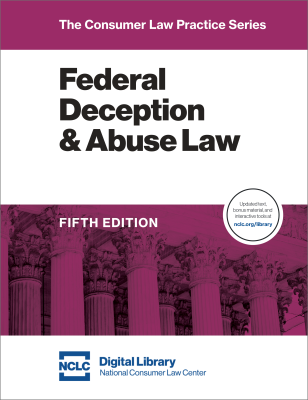Telephone Consumer Protection Act (TCPA) litigation involving unwanted calls and texts to cellphones is one of the hottest areas of consumer litigation, involving class and individual claims against debt collectors, telemarketers, banks, and many other businesses. Each unwanted call or text can result in $500 statutory damages ($1500 if the violation was willful or knowing). The TCPA is a strict liability statute, and there is no bona fide error defense.
Much attention has been paid to the recent D.C. Circuit decision in ACA International v. Federal Communications Commission, 885 F.3d 687 (D.C. Cir. 2018), as limiting the rights of TCPA litigants. This article will explain that the decision’s impact is largely supportive of consumer rights, and will also review a number of other significant 2018 TCPA circuit court rulings.
The decision and other recent TCPA rulings are examined in greater detail in the just-updated digital version of NCLC’s Federal Deception Law Chapter 6. Chapter 6 is a detailed analysis of all TCPA issues. This article provides numerous links to further analysis found in that chapter. For subscribers to NCLC’s just released Fair Debt Collection (9th ed. Mar. 2018), a new digital update to that treatise’s § 14.3.2 examines ACA International as it relates to TCPA claims against debt collectors.
The Holding in ACA International
ACA International is an appeal from a 2015 FCC ruling, In re Rules & Regulations Implementing the Tel. Consumer Prot. Act of 1991, 30 F.C.C. Rcd. 7961, at ¶ 15 (F.C.C. July 10, 2015), that in its 138 pages includes interpretations and rulings on a large number of aspects of the TCPA. Such FCC rulings cannot be challenged in the courts except through a petition to a circuit court of appeal under the Hobbs Act within sixty days of the FCC ruling. See NCLC’s Federal Deception Law § 6.2.4.3a. ACA International involves such a challenge, so the FCC’s 2015 ruling is binding on the courts except as limited by the D.C. Circuit’s decision in that case. ACA International sets aside certain parts of the 2015 FCC ruling, and thus is likely to be raised by defendants in almost all TCPA litigation. In actuality, ACA International does little to change current TCPA precedent and instead makes binding on the courts most aspects of the 2015 FCC ruling. Briefly, ACA International:- Sets aside the FCC’s definition of an autodialer. As explained below, the FCC’s previous rulings on the autodialer definition are still valid and the ACA International decision thus has a limited impact on this definition.
- Sets aside the FCC’s treatment of reassigned numbers. As described below, earlier court rulings on reassigned numbers now replace the FCC ruling, and many of these rulings are more pro-consumer than that offered by the FCC.
- Upholds the FCC’s rule that consumers can revoke consent, and can do so by any reasonable means. The FCC ruling that is now upheld is described below.
- Rejects the argument that an exemption that the FCC created for certain health-care related calls should be broader.
All Other Aspects of the 2015 FCC Ruling Are Now Binding on the Courts
Since all of the appeals from the FCC’s 2015 order were consolidated into ACA International, all aspects of that ruling not set aside by the D.C. Circuit are now binding on the courts under the Hobbs Act. See Federal Deception Law § 6.2.4.3a. For example, the following parts of the 2015 FCC ruling are now binding on the courts:- The caller has the burden of proving that it had consent to call or text the consumer’s cell phone, such as by retaining business records of that consent. § 6.11.5.
- The fact that a consumer’s wireless number is in the contact list of another person’s cell phone does not demonstrate the consumer’s consent to receive calls from a company with which the other person has a relationship. § 6.3.4.2.2.
- Provision of a cell phone number to a creditor in connection with a debt is considered consent. But that is consent only to receive calls closely related to the purpose for which the number was first provided. § 6.3.4.2.3.
- Consent may be given by a customary user who is included in a business or family calling plan or an intermediary, and consent to a landline call applies when that number is ported to a cell phone. § 6.3.4.2.2.
- Text messages, including SMS calls, are calls under the TCPA so that limits on calls to cell phones also apply to texts to cell phones. § 6.7.2.
- Callers cannot evade the definition of an autodialer by dividing the autodialing function among multiple pieces of equipment or by dividing ownership of the equipment among multiple entities. § 6.3.2.4.5.
- The TCPA’s restrictions on calls to numbers assigned to any service for which the called party is charged for the call include calls to a cell phone that has a limited number of minutes. See § 6.3.1.
- The FCC’s detailed analysis of the factors to determine who has made or initiated a robocall or text for purposes of liability under the Act when there are multiple parties involved is now binding on the courts. See § 6.9.2.3.
- Non-emergency informational calls, including calls by non-profits, can be made to cell phones only with the called party’s consent. § 6.3.3.1.
- The TCPA exemption for emergency calls, such as governmental calls about fires, police activity, or road closings, does not apply to calls from health care providers that advertise a product or deal with billing, accounting, or debt collection. ACA International explicitly affirms this. See § 6.3.3.2.
- The FCC’s adoption of a limited exception to the prior express consent requirement for free messages sent by telecommunication providers that ask if the called party wants to set up an account to receive collect calls from a prison inmate was left undisturbed by ACA International, as was a narrowly-drawn exemption for time-sensitive free-to-end user calls and messages sent by financial institutions and health care providers. § 6.3.3.2.
ACA International and the Definition of an Autodialer
The TCPA prohibits calls or texts to a cellphone without the consumer’s consent if the caller uses either:- An artificial or prerecorded voice; or
- An autodialer.
The TCPA defines an autodialer as “equipment which has the capacity to:
(A) store or produce telephone numbers to be called, using a random or sequential number generator; and
(B) dial such numbers.
The FCC has interpreted this definition on several occasions. In 2003, it held that a device cannot be excluded from the definition of an autodialer because it dials from a given set of numbers rather than from randomly or sequentially generated numbers. In re Rules and Regulations Implementing the Telephone Consumer Protection Act of 1991, 18 F.C.C. Rcd. 14,014, 14,115, at ¶¶ 131–135 (F.C.C. 2003).
That ruling also holds that a predictive dialer is an autodialer, noting that, like older autodialers, its basic function is the capacity to dial numbers without human intervention. A predictive dialer stores pre-programmed numbers or receives numbers from a computer database and then dials those numbers in a manner that maximizes efficiencies for call centers. In 2008, the FCC issued another declaratory ruling that reiterated that a predictive dialer is an autodialer. In re Rules and Regulations Implementing the Telephone Consumer Protection Act of 1991, 23 F.C.C. Rcd. 559 (F.C.C. 2008). The 2015 FCC ruling reiterated the conclusions of the 2003 and 2008 orders and added further interpretations. The 2015 order held that the dispositive question is not whether a particular call was placed through random or sequential generation of telephone numbers, but whether the system has the capacity to generate numbers in this way. The order also made it clear that the TCPA’s use of the word “capacity” includes potential as well as current capacity, so it does not exempt equipment that lacks the “present ability” to dial randomly or sequentially. Thus, hardware that can store or produce telephone numbers to be called using a random or sequential number generator is an autodialer even if software necessary to accomplish that functionality has not yet been installed. The D.C. Circuit set aside the portion of the 2015 ruling that deals with the definition of autodialer, primarily because of concern that the FCC’s broad interpretation of the term “capacity” could sweep in smartphones that consumers were using for ordinary purposes. The D.C. Circuit in no way ruled on the 2003 and 2008 orders, however, and these orders remain binding on the courts. For detailed support for this conclusion, see § 6.3.2.2. The 2003 and 2008 orders, coupled with the statute itself and pre-existing Circuit decisions, encompass most dialers used by robocallers even without the additional interpretations provided by the FCC’s 2015 order:- A device that dials from a given set of numbers rather than from randomly or sequentially generated numbers.
- A predictive dialer.
- A predictive dialer even if it cannot be programmed to generate random or sequential phone numbers.
- Any device that has the ability to dial numbers without human intervention, including a system that sends text messages en masse.


